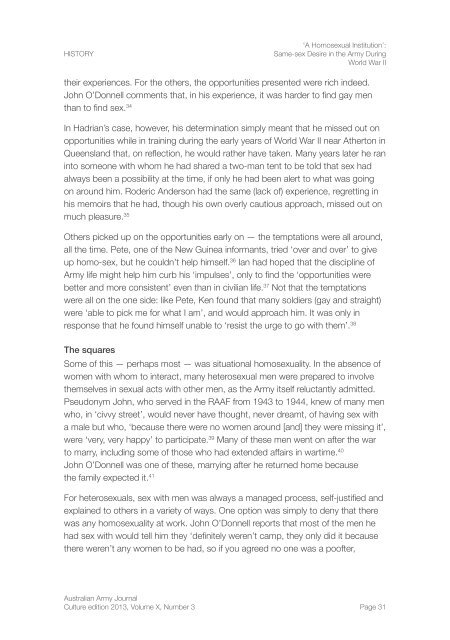Australian Army Journal
Australian Army Journal
Australian Army Journal
You also want an ePaper? Increase the reach of your titles
YUMPU automatically turns print PDFs into web optimized ePapers that Google loves.
HISTORY<br />
‘A Homosexual Institution’:<br />
Same-sex Desire in the <strong>Army</strong> During<br />
World War II<br />
their experiences. For the others, the opportunities presented were rich indeed.<br />
John O’Donnell comments that, in his experience, it was harder to find gay men<br />
than to find sex. 34<br />
In Hadrian’s case, however, his determination simply meant that he missed out on<br />
opportunities while in training during the early years of World War II near Atherton in<br />
Queensland that, on reflection, he would rather have taken. Many years later he ran<br />
into someone with whom he had shared a two-man tent to be told that sex had<br />
always been a possibility at the time, if only he had been alert to what was going<br />
on around him. Roderic Anderson had the same (lack of) experience, regretting in<br />
his memoirs that he had, though his own overly cautious approach, missed out on<br />
much pleasure. 35<br />
Others picked up on the opportunities early on — the temptations were all around,<br />
all the time. Pete, one of the New Guinea informants, tried ‘over and over’ to give<br />
up homo-sex, but he couldn’t help himself. 36 Ian had hoped that the discipline of<br />
<strong>Army</strong> life might help him curb his ‘impulses’, only to find the ‘opportunities were<br />
better and more consistent’ even than in civilian life. 37 Not that the temptations<br />
were all on the one side: like Pete, Ken found that many soldiers (gay and straight)<br />
were ‘able to pick me for what I am’, and would approach him. It was only in<br />
response that he found himself unable to ‘resist the urge to go with them’. 38<br />
The squares<br />
Some of this — perhaps most — was situational homosexuality. In the absence of<br />
women with whom to interact, many heterosexual men were prepared to involve<br />
themselves in sexual acts with other men, as the <strong>Army</strong> itself reluctantly admitted.<br />
Pseudonym John, who served in the RAAF from 1943 to 1944, knew of many men<br />
who, in ‘civvy street’, would never have thought, never dreamt, of having sex with<br />
a male but who, ‘because there were no women around [and] they were missing it’,<br />
were ‘very, very happy’ to participate. 39 Many of these men went on after the war<br />
to marry, including some of those who had extended affairs in wartime. 40<br />
John O’Donnell was one of these, marrying after he returned home because<br />
the family expected it. 41<br />
For heterosexuals, sex with men was always a managed process, self-justified and<br />
explained to others in a variety of ways. One option was simply to deny that there<br />
was any homosexuality at work. John O’Donnell reports that most of the men he<br />
had sex with would tell him they ‘definitely weren’t camp, they only did it because<br />
there weren’t any women to be had, so if you agreed no one was a poofter,<br />
<strong>Australian</strong> <strong>Army</strong> <strong>Journal</strong><br />
Culture edition 2013, Volume X, Number 3 Page 31

















